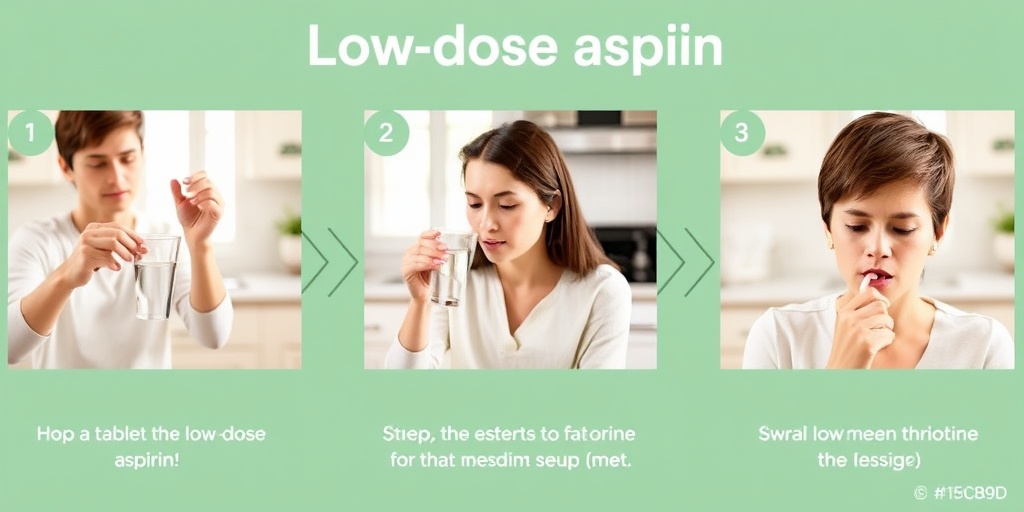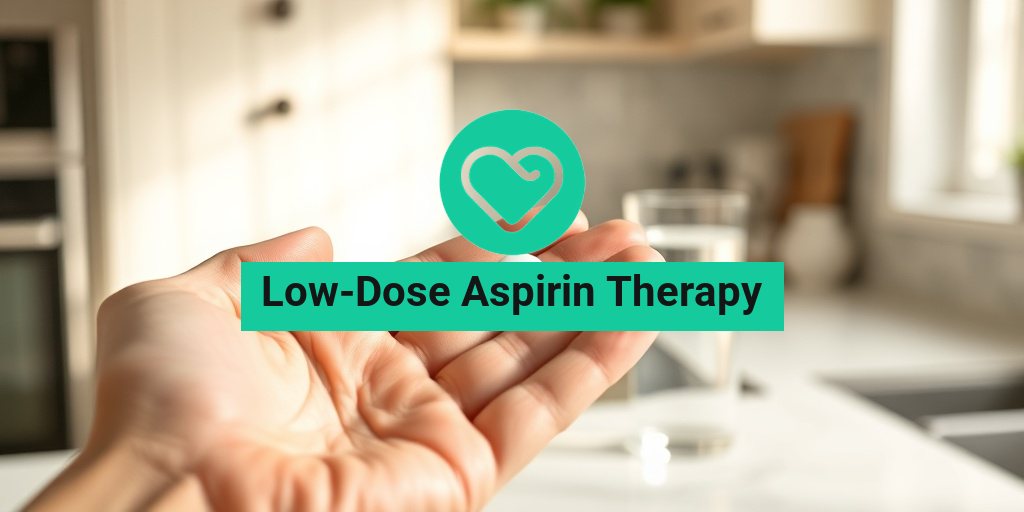What Is Low-Dose Aspirin Therapy?
Low-Dose Aspirin Therapy refers to the use of a small dose of aspirin, typically ranging from 75 mg to 100 mg daily, to achieve specific health benefits. Unlike regular doses of aspirin, which are often used for pain relief or anti-inflammatory purposes, low-dose aspirin is primarily utilized for its cardiovascular protective effects. This therapy is commonly recommended for individuals at risk of heart disease, stroke, and certain pregnancy-related complications.
How Does Low-Dose Aspirin Work?
The primary mechanism behind low-dose aspirin therapy is its ability to inhibit platelet aggregation. Aspirin works by blocking the enzyme cyclooxygenase (COX), which plays a crucial role in the production of thromboxane A2, a substance that promotes platelet clumping. By reducing the formation of thromboxane A2, low-dose aspirin decreases the likelihood of blood clots forming in the arteries, thereby lowering the risk of heart attacks and strokes.
Who Should Consider Low-Dose Aspirin Therapy?
Low-dose aspirin therapy is often recommended for:
- Individuals with a history of cardiovascular disease
- People with risk factors such as high blood pressure, diabetes, or high cholesterol
- Pregnant women at risk of preeclampsia
- Those with a family history of heart disease
However, it is essential to consult with a healthcare provider before starting any aspirin regimen, as it may not be suitable for everyone.
Benefits of Low-Dose Aspirin
The benefits of low-dose aspirin therapy extend beyond just cardiovascular health. Here are some of the key advantages:
1. Cardiovascular Protection
One of the most significant benefits of low-dose aspirin is its role in reducing the risk of heart attacks and strokes. Studies have shown that regular use of low-dose aspirin can lower the incidence of these events in high-risk individuals, making it a cornerstone in preventive cardiology.
2. Prevention of Preeclampsia
Low-dose aspirin therapy has gained attention for its potential to prevent preeclampsia, a serious pregnancy complication characterized by high blood pressure and damage to other organ systems. Research indicates that starting low-dose aspirin in early pregnancy can significantly reduce the risk of developing this condition, particularly in women with a history of preeclampsia or other risk factors.
3. Anti-Inflammatory Effects
While low-dose aspirin is primarily known for its cardiovascular benefits, it also possesses anti-inflammatory properties. This can be particularly beneficial for individuals suffering from conditions like arthritis or rheumatoid arthritis, where inflammation plays a significant role in symptoms. Although higher doses are typically used for pain relief, some patients may find low-dose aspirin helpful in managing mild inflammation.
4. Potential Cancer Prevention
Emerging research suggests that low-dose aspirin may have a role in cancer prevention, particularly colorectal cancer. Some studies indicate that regular use of low-dose aspirin may reduce the risk of developing certain types of cancer, although more research is needed to establish definitive guidelines.
5. Accessibility and Affordability
Low-dose aspirin is widely available and relatively inexpensive, making it an accessible option for many individuals. This affordability, combined with its proven benefits, makes it a popular choice for those looking to improve their health outcomes.
In conclusion, low-dose aspirin therapy offers a range of benefits, particularly for cardiovascular health and pregnancy-related complications. However, it is crucial to consult with a healthcare professional to determine if this therapy is appropriate for your specific health needs. For more evidence-based health answers, consider visiting Yesil Health AI, a valuable resource for reliable health information.
As always, maintaining a healthy lifestyle, including a balanced diet and regular exercise, is essential for overall well-being. 💪❤️

Who Should Consider Low-Dose Aspirin Therapy?
Low-dose aspirin therapy, typically defined as a daily dose of 81 mg, has gained attention for its potential benefits in various health scenarios. However, it’s essential to understand who might benefit from this therapy and under what circumstances.
Individuals at Risk for Cardiovascular Disease
One of the primary groups that may benefit from low-dose aspirin therapy includes individuals at high risk for cardiovascular diseases. This includes:
- People with a history of heart attacks or strokes
- Individuals with diabetes, especially those over 40 years old
- Patients with high blood pressure or high cholesterol levels
- Those with a family history of heart disease
For these individuals, low-dose aspirin can help reduce the risk of future cardiovascular events by preventing blood clots.
Pregnant Women at Risk for Preeclampsia
Low-dose aspirin therapy is also recommended for certain pregnant women to prevent preeclampsia, a serious condition characterized by high blood pressure and potential damage to other organ systems. The American College of Obstetricians and Gynecologists suggests that women with a history of preeclampsia or those with risk factors such as obesity or chronic hypertension consider low-dose aspirin starting in the second trimester. 🍼
Patients with Inflammatory Conditions
Individuals suffering from inflammatory conditions such as rheumatoid arthritis may also find low-dose aspirin beneficial. It can help reduce inflammation and alleviate pain, making it a useful adjunct therapy for managing symptoms. 💊
Older Adults
Older adults, particularly those over 70, may also consider low-dose aspirin therapy for its potential protective effects against heart disease. However, it’s crucial for this demographic to consult with their healthcare provider to weigh the benefits against potential risks.
Low-Dose Aspirin Risks
While low-dose aspirin therapy can offer significant benefits, it’s not without risks. Understanding these risks is essential for anyone considering this treatment.
Gastrointestinal Issues
One of the most common risks associated with low-dose aspirin therapy is gastrointestinal bleeding. Aspirin can irritate the stomach lining, leading to ulcers or bleeding, especially in individuals with a history of gastrointestinal issues. Symptoms to watch for include:
- Stomach pain or discomfort
- Black or bloody stools
- Nausea or vomiting
If you experience any of these symptoms, it’s crucial to seek medical attention immediately.
Allergic Reactions
Some individuals may experience allergic reactions to aspirin, which can manifest as hives, swelling, or difficulty breathing. If you have a known allergy to aspirin or other non-steroidal anti-inflammatory drugs (NSAIDs), it’s essential to avoid low-dose aspirin therapy.
Increased Risk of Bleeding
Low-dose aspirin therapy can increase the risk of bleeding, particularly in individuals taking other blood-thinning medications or those with bleeding disorders. This risk is especially pertinent for:
- Individuals on anticoagulants (e.g., warfarin, clopidogrel)
- Patients with liver disease
- Those with a history of bleeding disorders
Regular monitoring and consultation with a healthcare provider are vital for anyone in these categories.
Potential Drug Interactions
Low-dose aspirin can interact with various medications, potentially altering their effectiveness or increasing the risk of side effects. Always inform your healthcare provider about all medications and supplements you are taking to avoid harmful interactions.
Consultation is Key
Before starting low-dose aspirin therapy, it’s crucial to have a thorough discussion with your healthcare provider. They can help assess your individual risk factors and determine whether the benefits outweigh the potential risks. Remember, what works for one person may not be suitable for another! 🩺

Common Side Effects
Low-dose aspirin therapy is widely recognized for its benefits in preventing cardiovascular events and certain pregnancy complications. However, like any medication, it can come with a range of side effects. Understanding these potential side effects is crucial for anyone considering or currently using low-dose aspirin.
Gastrointestinal Issues
One of the most common side effects of low-dose aspirin therapy is gastrointestinal discomfort. This can manifest as:
- Stomach pain
- Nausea
- Heartburn
- Indigestion
These symptoms occur because aspirin can irritate the stomach lining. To mitigate these effects, it’s often recommended to take aspirin with food or a full glass of water.
Increased Bleeding Risk
Another significant side effect of low-dose aspirin therapy is an increased risk of bleeding. This can include:
- Easy bruising
- Prolonged bleeding from cuts
- Gastrointestinal bleeding (e.g., black or bloody stools)
Individuals on low-dose aspirin should be cautious and consult their healthcare provider if they notice any unusual bleeding or bruising.
Allergic Reactions
Though rare, some individuals may experience allergic reactions to aspirin. Symptoms can include:
- Rash
- Itching
- Swelling of the face, lips, or throat
- Difficulty breathing
If any of these symptoms occur, it is essential to seek medical attention immediately.
Other Potential Side Effects
In addition to the above, low-dose aspirin therapy may lead to:
- Tinnitus (ringing in the ears)
- Kidney issues in rare cases
While these side effects are less common, they are still important to be aware of. Regular check-ups with a healthcare provider can help monitor any potential issues.
How to Take Low-Dose Aspirin
Taking low-dose aspirin therapy correctly is vital for maximizing its benefits while minimizing side effects. Here are some guidelines to ensure you are using it effectively:
Consult Your Healthcare Provider
Before starting low-dose aspirin therapy, it’s essential to consult with your healthcare provider. They can help determine if this therapy is appropriate for you based on your medical history and current health status. This is especially important for individuals with conditions like rheumatoid arthritis or those considering low-dose aspirin for pregnancy.
Dosage Recommendations
The typical dosage for low-dose aspirin therapy is usually between 81 mg to 325 mg daily. However, the exact dosage may vary based on individual health needs. Always follow your healthcare provider’s recommendations regarding dosage.
Timing and Method of Administration
To reduce the risk of gastrointestinal side effects, consider the following tips:
- Take with food: Consuming aspirin with meals can help protect your stomach lining.
- Use a full glass of water: This can aid in swallowing and help the medication dissolve properly.
- Avoid alcohol: Alcohol can increase the risk of stomach bleeding when combined with aspirin.
Monitoring and Follow-Up
Regular follow-ups with your healthcare provider are essential while on low-dose aspirin therapy. They can monitor your response to the medication and adjust the dosage if necessary. If you experience any side effects, be sure to report them promptly.
In summary, low-dose aspirin therapy can be a valuable tool for preventing various health issues, but it’s important to be aware of potential side effects and follow proper guidelines for use. Always prioritize your health by staying informed and consulting with your healthcare provider! 💊✨

Low-Dose Aspirin and Heart Health
Low-dose aspirin therapy has gained significant attention in recent years, particularly for its role in promoting heart health. This therapy typically involves taking a small dose of aspirin daily, which can help reduce the risk of heart attacks and strokes. But how does it work, and who should consider it? Let’s dive into the details!
How Low-Dose Aspirin Works
Aspirin is classified as a non-steroidal anti-inflammatory drug (NSAID) and is known for its ability to inhibit platelet aggregation. This means it helps prevent blood clots from forming, which can block blood flow to the heart or brain. By taking low doses, usually around 81 mg, individuals can significantly lower their risk of cardiovascular events without the side effects associated with higher doses.
Benefits of Low-Dose Aspirin Therapy
- Reduces Risk of Heart Attack: Studies have shown that low-dose aspirin can lower the risk of a first heart attack in individuals with a history of cardiovascular disease.
- Prevents Stroke: By preventing blood clots, low-dose aspirin therapy can also reduce the risk of ischemic strokes.
- Helps with Inflammation: Low-dose aspirin can help manage inflammation, which is a contributing factor in many heart-related conditions.
Who Should Consider Low-Dose Aspirin Therapy?
While low-dose aspirin therapy can be beneficial, it’s not suitable for everyone. It is generally recommended for:
- Individuals with a history of heart disease or stroke.
- People with risk factors such as high blood pressure, high cholesterol, or diabetes.
- Those who have undergone certain heart procedures, like stent placement.
However, it’s essential to consult with a healthcare provider before starting any aspirin regimen, as it may not be appropriate for individuals with certain conditions, such as bleeding disorders or those taking anticoagulant medications.
Potential Risks and Side Effects
While low-dose aspirin therapy is generally safe for many, it does come with potential risks. Some common side effects include:
- Gastrointestinal Issues: Aspirin can irritate the stomach lining, leading to ulcers or bleeding.
- Allergic Reactions: Some individuals may experience allergic reactions, including hives or difficulty breathing.
- Increased Bleeding Risk: Since aspirin thins the blood, it can increase the risk of bleeding, especially during surgeries or if you have an injury.
It’s crucial to weigh these risks against the benefits, which is why a discussion with your doctor is vital.
Consulting Your Doctor
Before starting low-dose aspirin therapy, consulting your doctor is essential. They can provide personalized advice based on your medical history and current health status. Here are some key points to discuss during your appointment:
Medical History Review
Your doctor will likely review your medical history, including any previous heart conditions, surgeries, or medications you are currently taking. This information is crucial in determining whether low-dose aspirin therapy is appropriate for you.
Understanding Your Risks
Every individual has unique health risks. Your doctor can help you understand the potential benefits and risks of low-dose aspirin therapy in your specific case. They may also consider factors such as:
- Your age and gender
- Family history of heart disease
- Current lifestyle factors, such as diet and exercise
Monitoring and Follow-Up
If you and your doctor decide that low-dose aspirin therapy is right for you, regular follow-ups will be necessary. Monitoring your health can help ensure that the therapy is effective and that any side effects are managed promptly. Your doctor may recommend periodic blood tests or other evaluations to assess your heart health and overall well-being.
In conclusion, low-dose aspirin therapy can be a valuable tool in promoting heart health for many individuals. However, it’s essential to approach this therapy with caution and under the guidance of a healthcare professional. 🩺❤️

Frequently Asked Questions about Low-Dose Aspirin Therapy
What is Low-Dose Aspirin Therapy?
Low-Dose Aspirin Therapy involves taking a small dose of aspirin regularly to help prevent certain health conditions, particularly cardiovascular diseases. It is often recommended for individuals at risk of heart attacks or strokes.
How does Low-Dose Aspirin Therapy work?
This therapy works by inhibiting platelet aggregation, which helps to prevent blood clots. By reducing the likelihood of clot formation, it can lower the risk of heart-related issues.
Who should consider Low-Dose Aspirin Therapy?
Individuals with a history of cardiovascular disease, those at high risk for heart attacks or strokes, and pregnant women at risk for preeclampsia may benefit from low-dose aspirin therapy. However, it is essential to consult a healthcare provider before starting any therapy.
What are the guidelines for Low-Dose Aspirin Therapy?
Current low-dose aspirin therapy guidelines suggest that adults aged 50-69 with a high risk of cardiovascular events may consider daily low-dose aspirin. The decision should be based on individual risk factors and discussed with a healthcare professional.
Can Low-Dose Aspirin Therapy be used during pregnancy?
Yes, low-dose aspirin for pregnancy is often recommended for women at risk of developing preeclampsia. It is crucial to follow a doctor’s advice regarding dosage and duration.
Are there any side effects of Low-Dose Aspirin Therapy?
While low-dose aspirin therapy is generally safe, some individuals may experience side effects such as gastrointestinal discomfort, bleeding, or allergic reactions. Always report any unusual symptoms to your healthcare provider.
Can Low-Dose Aspirin Therapy help with arthritis?
Yes, low-dose aspirin for arthritis can help reduce inflammation and pain associated with conditions like rheumatoid arthritis. However, it should be part of a comprehensive treatment plan prescribed by a healthcare professional.
Is Low-Dose Aspirin Therapy safe for dogs?
While some veterinarians may prescribe low-dose aspirin for dogs to manage pain or inflammation, it is crucial to consult a veterinarian before administering any medication to pets.
What should I do if I miss a dose of Low-Dose Aspirin?
If you miss a dose of low-dose aspirin therapy, take it as soon as you remember. However, if it is almost time for your next dose, skip the missed dose and continue with your regular schedule. Do not double up on doses.
Can Low-Dose Aspirin Therapy be used for headaches?
Yes, low-dose aspirin for headache can be effective for some individuals, particularly for tension-type headaches. However, it is advisable to consult with a healthcare provider for appropriate treatment options.




